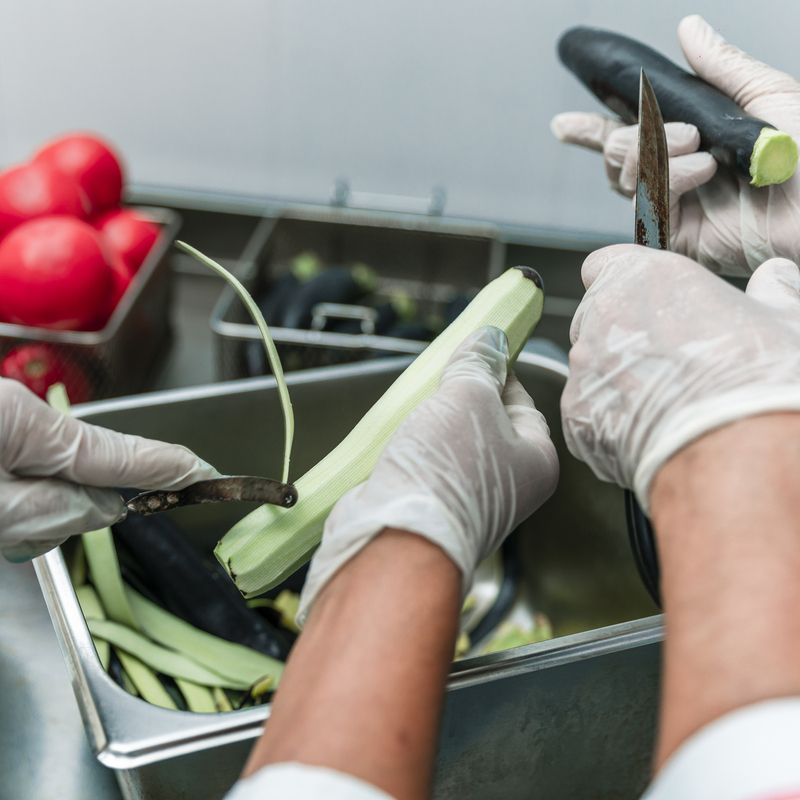
ISO 22000 Malaysia: Food Safety Management System
ISO 22000 Malaysia refers to the Food Safety Management System (FSMS) standard that ensures the safety of food products throughout the entire food chain, from production to consumption. This internationally recognised certification helps businesses in the food industry manage food safety risks, comply with regulations, and improve processes to ensure the delivery of safe and high-quality food to consumers. Implementing ISO 22000 in Malaysia demonstrates a company's commitment to food safety, builds consumer trust, and enhances business credibility in the competitive food market.
Multiple food safety standards, including ISO 22000, HACCP, Good Manufacturing Practices (GMP), Good Housekeeping Practices (GHP), Good Distribution Practices (GDP), Good Laboratory Practices (GLP), and Good Agriculture Practices (GAP), have been developed in response to the growing customer demand for safe food.
Compliance with ISO 22000 necessitates that all organisations, regardless of size, are involved in the food chain to ensure controlled food safety hazards and consistently safe food for human consumption. Food safety is, therefore, a shared duty primarily guaranteed by the collective efforts of all entities involved in the food chain. Even organisations producing equipment, cleansers, additives, ingredients, and packaging in food production are eligible for certification.
Talk to our ISO consultants for more information about the application of ISO 22000 in Malaysia. Find out the differences between FSSC 22000 and ISO 22000 here.
What Does ISO 22000 Apply To?
On June 19, 2018, ISO 22000:2018 was issued to unify global standards for food safety management. The ISO 22000, "Food safety management systems - Requirements for every organisation in the food chain," applies the same High-Level Structure (HLS) widely known to other ISO standards in order to be compatible with the current instruments for food safety management, which include ISO 9001:2015 and HACCP. It also aims to expand its reach for greater diligence. Until June 29, 2021, organizations have a three-year transition time, after which ISO 22000:2005 would no longer be valid.

Benefits of Obtaining ISO 22000 Certification
in Malaysia
FSSC 22000 Version 5: Food Safety Management Systems Certification Scheme
The Global Food Safety Initiative (GFSI) acknowledges and benchmarks the food safety certificate program called FSSC 22000. A branch of the Consumer Goods Forum, the GFSI brings retailers, manufacturers, and food service providers to synchronise food safety standards and evaluate them against a set of fundamental principles. Numerous large retailers and manufacturers demand their suppliers to register with a GFSI-recognized scheme due to the complex global food supply chain challenges. However, the GFSI does not recognise ISO 22000.
FSSC 22000 was created by the Foundation for Food Safety Certification and is based on the widely accepted ISO 22000 standard for food safety management systems. It also includes industry-relevant Pre-Requisite Programs (PRP), such as ISO TS 22002-1 for food manufacturing and ISO TS 22002-2 for packaging manufacturing, as well as GFSI-defined additional requirements. For integrated processes that cooperate to reduce and control the risks to food safety, FSSC 22000 specifies the requirements.
The certification programme focuses mainly on the production industries of food, feed, and packaging as well as storage and distribution, catering, and retail/wholesale. The scope of version 5 of FSSC 22000 has been expanded to include more supply chain segments, in contrast to earlier editions of the standard, which solely pertained to food manufacturers.

Benefits Of FSSC 22000
- Delivers a compelling management system framework fully integrated with the organisation’s overall management system. FSSC 22000 version 5 is also entirely consistent with other standards, such as ISO 9001 and ISO 14001 (including the alignment with the ISO High-Level Structure).
- Provides a robust Hazard Analysis and Risk Management methodology based on HACCP principles and assists in improving food safety effectiveness and efficiency.
- Pre-requisite programs with technical specifications, such as ISO TS 22002-1 for food manufacturing, provide additional due diligence along the supply chain and allow for adapting to customers' needs.
Who Needs Certification of ISO 22000 in Malaysia?
ISO 22000 certification is essential for businesses involved in the food supply chain.

Food Manufacturers:
Companies producing food products in Malaysia must comply with ISO 22000 to ensure their products meet international safety standards.
Food Processors:
Processors of raw materials and ingredients benefit from ISO 22000 to maintain high food safety standards throughout their operations.
Food Retailers:
Retailers can enhance their credibility and ensure the safety of their offerings by adopting ISO 22000 Malaysia certification.
Food Service Providers:
Restaurants, caterers, and other food service businesses in Malaysia use ISO 22000 to improve their food safety practices and gain consumer trust.
Packaging Suppliers:
Those supplying packaging materials for food products need ISO 22000 to ensure their materials meet safety and quality standards.
Transport and Storage Companies:
Firms involved in the transportation and storage of food products use ISO 22000 to manage risks and ensure compliance with safety regulations.
Steps to ISO 22000 Malaysia Certification
Request for Quotation
Contact us to select a package that suits your needs for ISO 22000 in Malaysia.Schedule a Consultation
Arrange a free initial consultation to discuss how ISO 22000 can benefit your organisation.ISO Introduction Training
Receive customised training on ISO 22000 to understand and apply food safety management practices.Document Preparation and Implementation
Prepare and implement necessary documentation to align with ISO 22000 standards.Internal and External Audits
Ensure your Food Safety Management System (FSMS) is compliant with ISO 22000 through comprehensive audits.Obtain Certification
Obtain your ISO 22000 certification and showcase your commitment to top-notch food safety management.
Elevate Food Safety Standards with ISO 22000 Malaysia Training
At One Island Consultancy, we offer comprehensive ISO 22000 Awareness training and Internal Audit Training designed to help businesses achieve world-class food safety management standards. Whether you are a food manufacturer, supplier, or service provider, our training equips your team with the knowledge and tools to implement an effective Food Safety Management System (FSMS).
Who Should Attend the Training of ISO 13485 Malaysia?
- Quality assurance and control teams.
- Food safety managers and officers.
- Production supervisors and operational staff.
- Business owners and entrepreneurs in the food and beverage sector.
Why Choose ISO 22000 Malaysia Training?
- Enhanced Food Safety Compliance: Gain a deeper understanding of ISO 22000 requirements to ensure compliance with both local and international food safety regulations.
- Minimised Risks: Learn how to identify, control, and prevent food safety hazards throughout the supply chain.
- Improved Operational Efficiency: Develop systematic processes that reduce waste, enhance efficiency, and ensure consistent product quality.
- Global Market Access: Achieving ISO 22000 compliance boosts your organisation’s reputation and opens doors to global opportunities.
What Our ISO 22000 Malaysia Training Covers
- Core principles of ISO 22000 and its integration with HACCP (Hazard Analysis and Critical Control Points).
- Developing and implementing a robust Food Safety Management System (FSMS).
- Risk assessment and mitigation strategies for food safety hazards.
- Internal auditing techniques to maintain compliance and prepare for certification.
Why Choose Us for ISO 22000 in Malaysia
At One Island Consultancy, we are dedicated to helping businesses in Malaysia achieve ISO 22000 in Malaysia certification with expert guidance and tailored solutions. Here's why we are the best choice for your ISO 22000 journey:
Expert Knowledge and Experience in ISO 22000 in Malaysia
Our team brings years of experience in ISO 22000 in Malaysia consulting. We have a deep understanding of the local food safety regulations and international standards, ensuring your organization meets the highest food safety management requirements.
Tailored Solutions for ISO 22000 in Malaysia
We provide customized solutions to fit your specific business needs. Whether you are a manufacturer, distributor, or food service provider, we offer practical guidance to implement ISO 22000 in Malaysia effectively, helping you improve food safety and operational efficiency.
Proven Success with ISO 22000 in Malaysia
Our proven track record speaks for itself. We've successfully helped numerous businesses across various industries in Malaysia achieve ISO 22000 certification. Our expert team ensures your business is fully equipped to maintain compliance and improve food safety practices.
Comprehensive Support for ISO 22000 in Malaysia
From the initial consultation to certification and beyond, we provide end-to-end support. We guide you through every step of the ISO 22000 Malaysia certification process, offering assistance with documentation, training, audits, and ongoing compliance.
Cost-Effective Solutions for ISO 22000 in Malaysia
We offer cost-effective services tailored to your budget. Our streamlined approach to ISO 22000 in Malaysia ensures that certification is achieved efficiently without unnecessary costs, while delivering long-term benefits to your food safety management system.
Continuous Improvement and Ongoing Support
After achieving ISO 22000 in Malaysia, we continue to support you with refresher training, audits, and guidance to ensure your food safety management system remains compliant and continually improves.
Explore More ISO Certification Options in Malaysia
At One Island Consultancy, we specialise in guiding businesses to achieve international standards across various industries. Whether it’s environmental management, food safety, or information security, we offer tailored solutions to meet your specific needs. Explore our range of ISO certifications:
Case Studies: Achieving ISO 22000 Certification in Malaysia
Explore how One Island Consultancy has helped businesses across various industries in Malaysia achieve ISO 22000 certification. These case studies showcase the challenges faced by different organizations, the solutions provided, and the successful outcomes that followed the implementation of a Food Safety Management System (FSMS) that complies with ISO 22000 Malaysia standards.
Case Study 1: Food Manufacturer A – Expanding into International Markets
Industry: Food Manufacturing
Challenge:
Food Manufacturer A, a well-established food producer in Malaysia, faced challenges with ensuring the quality and safety of their products while looking to expand into international markets. They needed ISO 22000 Malaysia certification to comply with global food safety regulations and attract international clients.
Solution:
One Island Consultancy helped Food Manufacturer A implement ISO 22000 Malaysia by first conducting a gap analysis to identify areas where their existing food safety management system (FSMS) was lacking. We guided them in developing comprehensive processes for hazard analysis, risk assessment, and documentation. We also provided tailored training for their staff to ensure all employees understood the requirements of ISO 22000 and how to maintain compliance.
Outcome:
Food Manufacturer A successfully achieved ISO 22000 certification and was able to enter international markets with confidence. The certification boosted their reputation among customers and regulatory bodies, ensuring consistent product safety and quality. The business also improved its internal processes, reducing waste and increasing operational efficiency.
Case Study 2: Restaurant Chain B – Enhancing Food Safety and Customer Trust
Industry: Food Service (Restaurant Chain)
Challenge:
Restaurant Chain B, with multiple outlets across Malaysia, struggled with maintaining consistent food safety standards across all locations. They wanted to implement a standardized food safety management system that would help them meet regulatory requirements and build customer trust.
Solution:
One Island Consultancy worked closely with Restaurant Chain B to implement ISO 22000 Malaysia, focusing on developing a unified food safety management system across all outlets. We helped them streamline their food safety procedures, focusing on hazard control, proper handling, and traceability from supplier to service. We also conducted comprehensive training for restaurant staff to ensure adherence to food safety standards.
Outcome:
After implementing ISO 22000 Malaysia, Restaurant Chain B saw a marked improvement in food safety, reducing incidents of contamination and enhancing consistency in product quality. The certification helped them increase customer confidence, boost their brand reputation, and ensure compliance with local and international food safety regulations.
Case Study 3: Food Processing Company C – Improving Operational Efficiency and Compliance
Industry: Food Processing
Challenge:
Food Processing Company C, a large producer of packaged food in Malaysia, struggled with maintaining consistency in product quality and food safety across its production lines. They needed a system that would improve operational efficiency, reduce waste, and meet local and international food safety standards.
Solution:
One Island Consultancy helped Food Processing Company C implement ISO 22000 Malaysia by first conducting a thorough audit of their current practices. We then guided them in setting up a food safety management system that complied with the ISO 22000 standards. This included establishing standard operating procedures (SOPs) for every stage of production, from receiving raw materials to packaging and distribution.
Outcome:
Food Processing Company C successfully achieved ISO 22000 certification and saw immediate improvements in operational efficiency. The certification enabled them to streamline their production processes, reduce waste, and minimize food safety risks. As a result, they not only met regulatory requirements but also enhanced their ability to compete in international markets.
Case Study 4: Exporter D – Meeting International Food Safety Standards
Industry: Food Exporting
Challenge:
Exporter D, a company based in Malaysia that exports food products to international markets, struggled to meet the food safety regulations required by foreign markets. To expand their exports and meet regulatory demands, they needed ISO 22000 certification to prove their commitment to food safety and quality.
Solution:
One Island Consultancy worked with Exporter D to implement ISO 22000 Malaysia, helping them develop and document a food safety management system that met both local and international food safety standards. We provided comprehensive training to their management team and staff to ensure everyone understood the food safety hazards and how to mitigate them. We also assisted in conducting internal audits and implementing continuous improvement processes.
Outcome:
With ISO 22000 Malaysia certification, Exporter D successfully met the stringent food safety requirements of international markets. The certification enhanced their credibility and opened doors to more global business opportunities. Their products gained wider acceptance in international markets, and they were able to ensure a higher standard of food safety across their entire supply chain.

Frequently Asked Questions
2. Regulatory Compliance: Meet Malaysia’s food safety laws and international standards.
3. Improved Efficiency: Streamline processes and reduce waste.
4. Increased Market Access: Boost your brand’s credibility and open global market opportunities.
1. Food safety policies and objectives.
2. HACCP (Hazard Analysis and Critical Control Points) plans.
3. Monitoring, verification, and validation records.
4. Employee training documentation.
5. Internal audit reports and corrective actions.
Start your journey toward food safety excellence with ISO 22000 Malaysia certification. Contact us today to learn how we can assist you!


